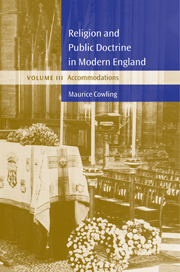Book contents
- Frontmatter
- Contents
- Foreword and acknowledgements
- Introduction
- I The Christian intellect and modern thought in modern England
- 1 The reanimation of Protestantism I
- 2 Christianity and literature I
- 3 The reanimation of Protestantism II
- 4 The enlargement of Christianity
- 5 Christianity and literature II
- 6 Christianity and modern knowledge I
- 7 Whiggism, Liberalism and Christianity I
- 8 Whiggism, Liberalism and Christianity II
- 9 Christianity and modern knowledge II
- 10 Christianity in an unfriendly world I
- 11 Christianity in an unfriendly world II
- 12 Christianity in an unfriendly world III
- 13 Christianity in an unfriendly world IV
- 14 Christianity in an unfriendly world V
- II The post-Christian consensus
- III Conclusion: religion and public doctrine in modern England
- Notes
- Index of proper names
12 - Christianity in an unfriendly world III
Published online by Cambridge University Press: 23 December 2009
- Frontmatter
- Contents
- Foreword and acknowledgements
- Introduction
- I The Christian intellect and modern thought in modern England
- 1 The reanimation of Protestantism I
- 2 Christianity and literature I
- 3 The reanimation of Protestantism II
- 4 The enlargement of Christianity
- 5 Christianity and literature II
- 6 Christianity and modern knowledge I
- 7 Whiggism, Liberalism and Christianity I
- 8 Whiggism, Liberalism and Christianity II
- 9 Christianity and modern knowledge II
- 10 Christianity in an unfriendly world I
- 11 Christianity in an unfriendly world II
- 12 Christianity in an unfriendly world III
- 13 Christianity in an unfriendly world IV
- 14 Christianity in an unfriendly world V
- II The post-Christian consensus
- III Conclusion: religion and public doctrine in modern England
- Notes
- Index of proper names
Summary
Religion … has always suffered by its connection with the State, and … no Church has ever existed … which has not lost something of its independence and its freedom when it became a department of the State.
(Rt. Hon. Joseph Chamberlain, Speech at Glasgow, 15 September 1885, in H.W. Lucy, ed., The Speeches of the Rt. Hon. Joseph Chamberlain, 1885, pp. 195–6)When the religious history of the generation in which we are living comes to be written by our descendants, they will … say with truth that Christendom has been passing through a great revolution in the last thirty years … that … it … has absorbed all the results of science, of criticism, of investigation, in every field of thought; that it is showing gradually, without the ostentation of apologetic polemics but showing by practice, that it can assimilate all those new elements of enlightenment and progress: and that the teaching of Christianity need not be, and ought not to be … of a character which leaves science and knowledge on one side, and goes its own way, ignoring all that may be done in other departments of human learning and human effort.
(Rt. Hon. A. J. Balfour, speech at Crowborough, 6 June 1906, in W. M. Short, Arthur James Balfour As Philosopher and Thinker, 1912, pp. 278–9)I travelled to London in order to attend the funeral of Neville Chamberlain in the Abbey … I could not but reflect on the profound significance of the fact that an avowed Unitarian was buried in the Abbey with full rites as if he had been an orthodox Christian … […]
- Type
- Chapter
- Information
- Religion and Public Doctrine in Modern England , pp. 319 - 336Publisher: Cambridge University PressPrint publication year: 2001



